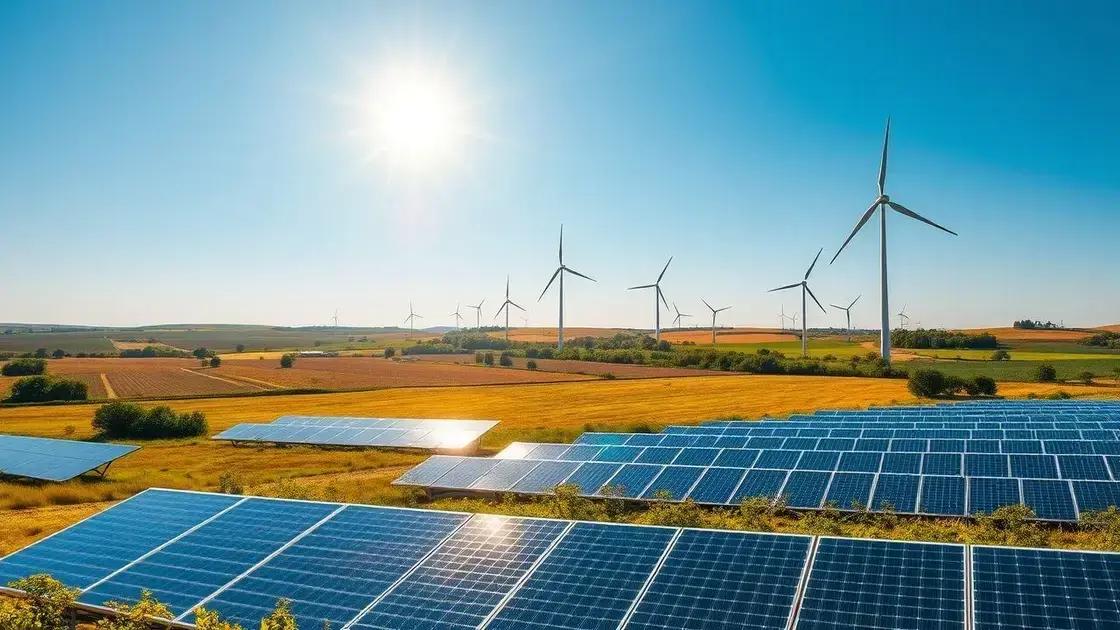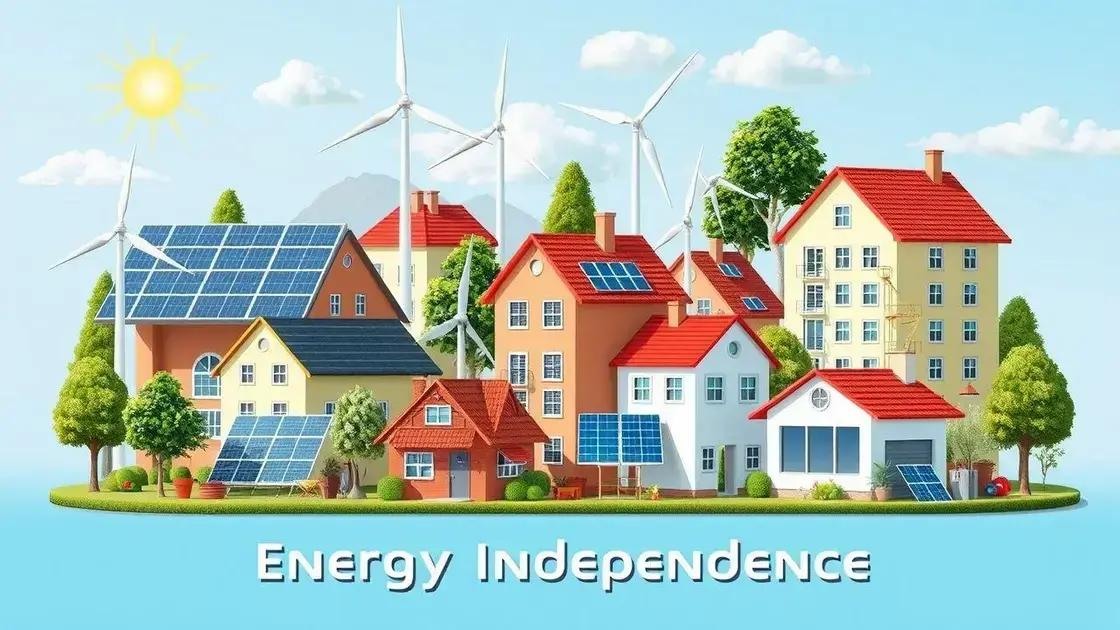energy independence efforts: the path to sustainable living

Anúncios
Energy independence efforts focus on reducing reliance on foreign energy sources through renewable technologies, creating economic growth, improving sustainability, and empowering communities to take charge of their energy needs.
Energy independence efforts are gaining momentum as communities seek sustainable ways to power their lives. Have you ever considered how these initiatives could transform your neighborhood or even your daily routine? Let’s delve into the impact of energy independence.
Anúncios
understanding energy independence
Understanding energy independence is vital in today’s world. It refers to a nation’s ability to produce its own energy without relying on foreign sources. This shift can lead to enhanced security and reduced vulnerability to geopolitical issues.
When we think about energy independence, several factors come into play. Exploring these key components helps us grasp its significance:
Anúncios
Key Components of Energy Independence
Energy independence doesn’t just happen overnight; it requires strategic planning and investment. Here are some crucial elements:
- Renewable Resources: Utilizing wind, solar, and hydroelectric power significantly decreases reliance on fossil fuels.
- Energy Efficiency: Improving efficiency in homes and businesses minimizes energy waste, enabling better resource management.
- Technological Innovation: Advancements in battery storage and smart grid technologies enhance energy systems’ reliability.
- Policy Frameworks: Strong policies and incentives encourage the development of local energy sources.
As nations strive for energy independence, public support plays a vital role. Public awareness and advocacy can catalyze government initiatives aimed at sustainability. Additionally, these efforts empower communities to embrace energy solutions tailored to their needs.
It’s also important to recognize the environmental benefits. By adopting clean energy sources, we contribute to a reduction in greenhouse gas emissions. This not only helps combat climate change but also promotes the health of local ecosystems.
Financial investment in energy independence can lead to economic growth as well. Creating jobs in renewable energy sectors fosters local economies while decreasing energy costs for consumers.
key benefits of energy independence efforts

The key benefits of energy independence efforts are profound and far-reaching. Achieving energy independence not only enhances national security but also boosts economic growth and environmental sustainability.
When a country moves toward self-sufficiency in energy, it reduces its dependency on foreign oil. This shift leads to greater stability in the energy market, which protects consumers from price fluctuations caused by international events. It establishes a sense of security and helps maintain control over domestic resources.
Economic Growth
Energy independence can significantly contribute to economic growth. Investing in local energy sources creates jobs and stimulates economic activity within communities. Industries related to renewable energy, such as solar and wind, are rapidly expanding, offering new employment opportunities for skilled workers.
- Job Creation: New jobs in construction, maintenance, and technology can arise from renewable energy projects.
- Local Investment: Money spent on local energy resources circulates in the community, benefiting local businesses.
- Reduced Energy Costs: With a focus on local energy sources, households can see decreased energy bills as competition increases.
- Energy Innovation: The drive for independence fosters innovation in energy technology and services.
Moreover, transitioning to renewable energy sources significantly lowers greenhouse gas emissions. This transition is crucial in combatting climate change and improving public health. Utilizing cleaner energy sources leads to fewer health issues related to pollution.
By promoting energy independence, governments can enhance energy efficiency and infrastructure. Upgrading to smarter grids and more efficient appliances ensures that energy is used effectively, benefiting both the economy and the environment.
The social aspect of energy independence deserves attention, too. Communities can take charge of their energy future, leading to increased civic engagement and awareness of sustainability issues. This empowerment creates a culture of responsibility and innovation.
innovative solutions for energy independence
Innovative solutions for energy independence are crucial as we seek ways to power our homes and businesses sustainably. These solutions range from cutting-edge technologies to community-driven initiatives that empower individuals to take charge of their energy needs.
One major innovative solution is the advancement of renewable energy technologies. Solar power has seen significant improvements in efficiency and affordability over the years. With the advent of solar panels that can generate power even in low light conditions, more households can harness this clean energy source.
New Energy Storage Solutions
Energy storage technology, such as batteries, is essential for making renewable energy more reliable. These systems store excess energy generated during sunny or windy days for use when demand is high or production is low. Innovations in battery technology, like lithium-ion batteries and flow batteries, are continuously evolving to provide longer lifespans and higher storage capacities.
- Smart Grids: Integrating smart technologies enables better energy management and enhances the resilience of the power grid.
- Microgrids: These localized power systems can operate independently from the main grid, ensuring energy availability during outages.
- Demand Response: Adjusting electricity usage during peak times helps balance supply and demand, making energy consumption more efficient.
- Community Solar Projects: These initiatives allow multiple households to share the benefits of a single solar installation, expanding access to renewable energy.
Another innovative approach is the development of energy-efficient appliances and systems. Smart home technologies enable users to optimize their energy use, reducing wastage and improving overall efficiency. Examples include smart thermostats, energy monitors, and automated lighting systems that respond to real-time energy consumption data.
Public awareness and education are equally important in fostering innovation. By informing communities about the available technologies and methods, we can inspire collective action to pursue energy independence. Workshops and informational campaigns can cultivate interest in renewable solutions and encourage involvement in local energy initiatives.
challenges in achieving energy independence

There are several significant challenges in achieving energy independence. Understanding these obstacles can help governments and communities work towards sustainable solutions.
One of the primary challenges is the dependence on existing energy infrastructures. Many countries rely heavily on fossil fuels, making any transition difficult. This reliance can slow down the adoption of renewable energy technologies due to economic and political interests.
Investment and Financial Barriers
Securing funding for renewable projects can be a daunting task. Investments in solar, winds, and other renewable sources often require substantial upfront costs. Even when long-term savings are evident, getting initial buy-in can be challenging for both investors and communities.
- Regulatory Hurdles: Different regulations across regions can complicate the deployment of new technologies and energy systems.
- Market Competition: Fossil fuel industries often have a stronghold on energy markets, making it hard for renewables to compete.
- Public Awareness: Lack of knowledge about benefits and accessibility of renewable energy can limit community support.
- Policy Consistency: Frequent shifts in policies and government support for energy initiatives can deter long-term investment.
Another issue is the technological limitations that exist within renewable resources. While technologies are improving, current systems may not yet provide the reliability and capacity needed to fully replace fossil fuels.
For example, solar and wind energy generation can be unpredictable, depending on weather conditions. Such variability makes energy storage options essential, yet these technologies are still developing, creating additional challenges.
Lastly, environmental and social impacts must be considered. Transitioning to renewable energy can lead to habitat disruption, especially when installing solar farms or wind turbines. Engaging local communities in this transition is crucial to address their concerns and ensure sustainable practices.
FAQ – Frequently Asked Questions about Energy Independence Efforts
What is energy independence?
Energy independence refers to a country’s ability to produce its own energy without relying on foreign sources, enhancing security and stability.
What are the benefits of pursuing energy independence?
The benefits include economic growth, job creation, reduced reliance on fossil fuels, and environmental sustainability.
What are some challenges to achieving energy independence?
Challenges include dependence on existing infrastructures, investment barriers, and technological limitations in renewable energy.
How can communities support energy independence initiatives?
Communities can engage in local energy projects, advocate for renewable solutions, and invest in education to promote awareness and participation.






